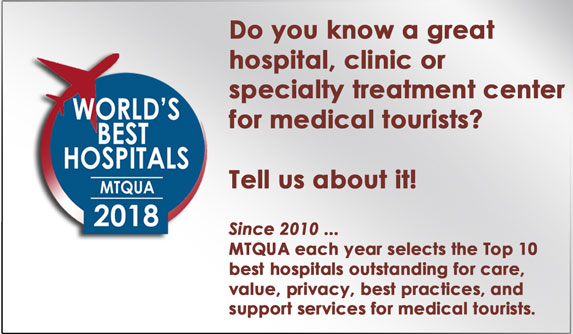 Understanding a customer’s wants is far more valuable than knowing his needs.
Understanding a customer’s wants is far more valuable than knowing his needs.
Marketing experts know people place more value on – and will pay a lot more money for – what they want while they spend as little as possible for what they need.
Doctors are no different. They will pay as little as possible for the laundry list of services they need that will help them grow their medical tourism business. They will pay a lot more if I can offer services they want
What does a medical tourism doctor need?
I wanted to write an article about the role of medical tourism facilitator as partner with doctors and hospitals, and about the advantages they get by working with a facilitator.
Instead, as I sat down with my list in hand, ready to herald, proclaim, promote, brag about, tout all the services we provide doctors and hospitals and why they need people like me, I found myself writing about how I convinced my first surgeon to trust me to create his medical tourism business.
What does a medical tourism doctor want?
Those of us providing facilitation and care management for even a few years know that the services and features we provide the doctors and hospitals we work with are valuable benefits they need in order to be successful in attracting and attending to and satisfying medical tourists.
Many of us have probably created lists and fancy brochures for the doctors we work with, detailing these various services, features, benefits, needs, all in great detail, appealing to their professionalism and oozing common sense.
Yet in spite of the logic, presentation and obvious general “win-win” proposition, many of us are still met with a surgeon’s indifference when we propose helping them build their medical tourism business, especially exclusively. We experience their unwillingness to compensate us for the important benefits we provide and pressing needs we fill.
Inspire desire
Would this rejection and skepticism be such common reactions if we knew how to “inspire desire?”
Would doctors react this way if we could make them want to work with us?
As we all surely know from our personal lives, there is nothing like passion to inspire desire! Don’t think it isn’t relevant in the workplace… whether yours or theirs!
What does passion have to do with benefits? Not much, until we make the connection that benefits must provide results the customer will value, which is not necessarily what we value or what we think they should value.
Fulfill passions
In an excellent article, Luke Hawthorne writes that “the real result within each benefit is how the product or service will make your potential customer feel.”
Hawthorne reminds us that people determine what they value by how they feel and that we want certain things for how they make us feel.
And passion is most definitely a feeling and most certainly inspires desire!
I was reading Hawthorne as I was writing my own “benefit list” for this post. It made me realize that the benefits of working together must be approached from the point of view of fulfilling desires rather than simply meeting needs.
My first time
I recall the first time I successfully “pitched” a surgeon… without any quantifiable benefits to expound upon…
It was 2002 and I was living in Brazil, just months after my own plastic surgery. It was late in the evening and I was sitting in my surgeon’s office for the umpteenth time, making sure I had accurately translated the post-op instructions for the patients I knew I would eventually send to him.
As generous and accommodating as he had been in donating many hours of his time to me while I constructed the protocols for my pioneering endeavor, I could see that he was more than skeptical, unconvinced that foreign patients would come all the way to Brazil for major surgery, on my word and without first meeting him.
I was keenly aware he had been graciously, if not begrudgingly, indulging me these hours with little hope of a return on the investment. But I firmly believed this would work and I needed to reassure him. By now, I considered him a friend and I felt I knew what he valued.
I truly respected and liked this man and I wanted to help him just as much as I wanted to help other patients like myself.
The elevator speech
As his optimism wavered and mine soared, I realized it was time for the “elevator speech” – the 30-second pitch about services and benefits and results – but I didn’t possess any of these services, not yet, not like I have today of course, after so many years in this industry.
But what I did have were feelings, strong feelings, and they became the basis of my first, and most successful elevator speech that very night. Here’s how it went…
“I want you to be able to only do the surgeries you most want to do.
“I want you to be able to leave the office by 6 pm instead of 9 pm like you do now so you can spend time with your family.
“I want you to have more patients and make more money because what you DO is incredible!
“I want people to know that you are an excellent plastic surgeon and you deserve recognition for it.
“You are a surgeon because you love what you do and it shows!”
At that moment, I realized how lucky he was and just how lucky I was about to become. We had passion and a love for what we did and, lucky for us, it was what we would do every day!
The speech worked. We spent a few more working evenings together and hosted our first patient a few weeks later.
That was 10 years ago. Without my having any previous experience in providing services and benefits to surgeons, I knew instinctively what would inspire his desire and I knew his passion for his work was at its core.
Recognition, appreciation and value
I knew what he wanted, what all good surgeons want and value – what we all want and value.
The very basic core desires and wants of the doctors you meet and work with are to have more patients. More patients mean more money. More money means more freedom.
And more freedom means being more in control of their lives.
Doctors you work with want less “ancillary work” and more time for surgeries. This gives them more time to spend doing what they love (and have passion for), and this means feeling more fulfilled.
Doctors want to give their patients good results. This in turn gives them respect from colleagues and recognition from other patients, and this makes them feel important, appreciated and valued.
Ultimately, this recognition, appreciation and value lead to more referrals, which means more patients, and so it goes.
So, as facilitators, with a desire (hopefully a passionate one) to help provide optimal experiences and successful transformations for our patients, we should be working with surgeons that have a passion for what they do and we must appeal to this passion in order to make them understand the benefits in working with us as well as solidify the working relationship.
So how do we do that?
Christi deMoraes is a medical travel facilitator and CEO of MedNet Brazil.

 >
>